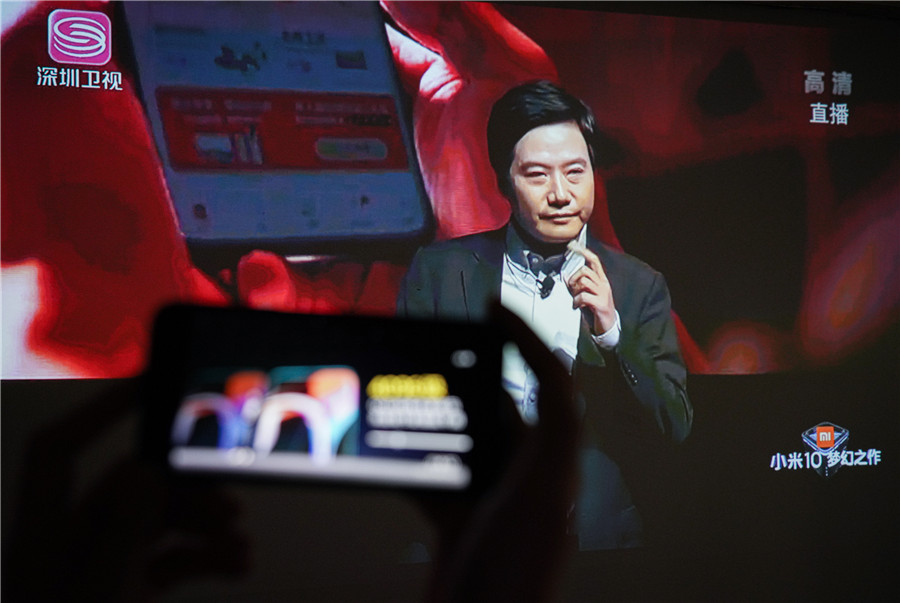Biz as usual for cellphone companies


On Feb 13, Xiaomi founder Lei Jun, face covered with the mandatory mask, found himself at a highly unusual virtual launch. The company's new flagship smartphone Mi 10 series dialed the world using a livestreamed event.
Lei said: "Life may be impacted by the epidemic, but we can't be defeated by the virus."
The company's revenue in 2019, he disclosed, exceeded 200 billion yuan ($28.6 billion), and its research and development spending topped 7 billion yuan.
"This year, we will pour 10 billion yuan into R&D as we officially march into the premium segment," he said.
Lei said the Mi 10 marks Xiaomi's first-ever attempt to dash into the high-end smartphone segment. With the basic version priced at 3,999 yuan, the Mi 10 is equipped with Qualcomm's Snapdragon 865 platform and a cutting-edge camera.
Like Xiaomi, Huawei Technologies Co, the largest smartphone maker in China, is adopting a business-as-usual approach to operations during the epidemic. It stuck to its original plan of holding a launch event on Feb 24, where it unveiled its latest 5G smartphones and other cutting-edge products powered by the wireless technology.
Though MWC Barcelona 2020 was canceled, Huawei held a separate launch itself and announced new measures to build its mobile ecosystem for Huawei Mobile Services. The move will signal laying the foundation for Huawei's ability to sell smart devices in overseas markets.
This is key for Huawei to grow its overseas smartphone business, which has been harmed significantly by the US government's restriction on the company's use of Google's Android operating system.
Despite the epidemic outbreak, Huawei said it had already resumed production of smartphones, with most of the business resuming operations in Dongguan, Guangdong province.
Much like Xiaomi and Huawei, another Chinese smartphone maker Realme, a new kid on the tech block, went ahead with its launch of its "high-end 5G smartphone models "on Feb 24. Only, the location changed from Barcelona to Madrid, and was live-streamed.
"We will step up our push to march into the premium smartphone segment in Europe this year," the company said in a statement.
Realme said it will target a 100-percent year-on-year growth in shipments this year. It shipped 25 million smartphones in 2019, marking a 500-percent year-on-year growth.
In January when Realme unveiled its first smartphone model in Beijing made for the China market, Li Bingzhong, its founder and CEO, said: "We are the fastest-growing smartphone brand, with our products available in 22 markets around the world."
Not to be outdone, Chinese smartphone vendor Oppo said the global launch event for its Find X2 smartphone series, which was originally scheduled for Feb 22 ahead of MWC Barcelona 2020, will go ahead but with a delay till March.
"We did not cancel our plan but just delayed it a little bit. We are determined to expand presence and investment in Europe this year. The ambition is not changed by the epidemic," an employee of Oppo, who sought anonymity, said.
Earlier, Chen Mingyong, CEO of Oppo, said the company would invest 50 billion yuan from this year to 2022 in R&D, as it aims to hone its technological prowess amid fierce competition in the 5G-enabled internet of things era.
Chen said Oppo's R&D spending will focus on 5G research, 6G, artificial intelligence, augmented reality, and other emerging technologies. Also, it will be used to fund more efforts to develop core fundamental architecture for hardware, and to boost its software capabilities.
"We have faith in our ability to sharpen the sword in 10 years and we will ramp up efforts to build our own technical competence," Chen said.
Oppo's smartphones are already available in more than 40 countries and regions. In June 2018, Oppo launched its high-end smartphone model Find X in Paris, marking its foray into Europe.
The Dongguan-based company has been selling 5G smartphones in key European markets since May, with promising sales in Sweden, Italy and the United Kingdom.
The move is part of Oppo's "5G Landing Project", an initiative to drive cooperation with global network operators, promote the implementation of 5G products and services and connect related new industries.
Market research company Strategy Analytics forecast the Chinese market will ship 5 percent fewer smartphones than expected in 2020, with global smartphone shipments likely to see a 2-percent drop due to the epidemic's impact on supply and manufacturing.
Any delay in operations at factories, due to either quarantine or travel restrictions, will inevitably cause a temporary labor shortage, Strategy Analytics said.
Li Zheng, a telecom analyst at market research company CCID Consulting, however, said that though the epidemic will pose short-term challenges to the global smartphone industry, it will not erase consumers' demand for better handsets.
The impact will be the biggest in the first quarter, but later, the effects of the epidemic are highly likely to be offset by consumers' enthusiasm to try on new devices, Li said.




































